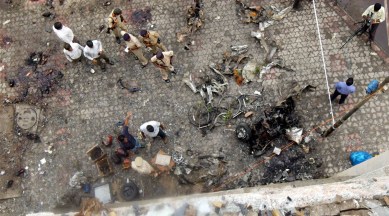Stay updated with the latest - Click here to follow us on Instagram
38 get death penalty, 11 life in jail for 2008 terror blasts in Ahmedabad that killed 56
Defence lawyers said the death penalty for 38 convicts is the highest in a single case in the country — in 1998, a TADA court had handed the death sentence to 26 accused in the assassination of former Prime Minister Rajiv Gandhi.

A special court, designated for speedy trial of the accused in the 2008 Ahmedabad serial blasts that killed 56 people and injured over 200, handed the death sentence Friday to 38 of 49 convicts. The remaining 11 have been awarded life terms in jail.
The 49 were convicted on February 8 by special judge A R Patel who acquitted 38 other accused in the case.
monthly limit of free stories.
with an Express account.
Defence lawyers said the death penalty for 38 convicts is the highest in a single case in the country — in 1998, a TADA court had handed the death sentence to 26 accused in the assassination of former Prime Minister Rajiv Gandhi.
While the sentencing order has not yet been put in the public domain, the prosecution claimed that the accused planned the serial blasts as “revenge” for the 2002 post-Godhra riots in Gujarat and to overthrow a democratically-elected government. Prosecutors said the accused were trying to target elected leaders such as Narendra Modi, the then Chief Minister, and other state ministers including Amit Shah, Anandiben Patel, Nitin Patel.
During final arguments, the prosecution said that “by indulging in anti-national terror activities,” the accused are “not even required to be kept in the country’s jail,” and if they are “kept in society, then it will be equivalent to setting loose a man-eating leopard”.
Those awarded the death sentence had been convicted under IPC sections 302 (murder) and 120B (criminal conspiracy) and provisions of the UAPA.
They include Safdar Nagori, leader of the banned SIMI, who was sentenced to life imprisonment by a CBI court in Indore in 2017 for sedition, possession of illegal arms and explosives, and for plotting terror activities; Saif-ur-Rehman and Mohammad Saif who have already been awarded the death penalty for the 2008 Jaipur serial blasts; Mohammadsadik alias Yaseer from Mumbai who is facing trial in the 2008 Delhi blasts case, and for opening fire outside the American Center in Kolkata in January 2002 that killed four policemen and a private security guard; Qayamuddin Kapadiya from Vadodara who is considered one of the key conspirators in the Delhi blasts case.
Those facing trial in other serial blasts cases are Qamruddin Chand Mohammad Nagori, Aamil Parvaz Qazi Saifuddin Farooqi, Shibli Abdul Kareem, Mohammad Arif Badruddin Shaikh, Mohammad Mansoor Asghar Peerbhoy, Mubeen Kadar Shaikh, Asif Bashiruddin Shaikh, and Asadullah Abu Bakar H.
Abu Bakar has also been convicted in the Vagamon case in Kerala. Shibli Abdulkarim and his brother Saaduli too stood trial in connection with a secret meeting of SIMI in Vagamon.
(Express photo by Nirmal Harindran)
All convicts were present for the hearing via video-conference from eight different jails. Of the 38 acquitted on February 8, 17 continue to be in judicial custody over charges in other criminal cases.
Ayaz Saiyed, a resident of Vatva in Ahmedabad, was acquitted of all charges in the Ahmedabad serial blasts and pardoned after he turned approver in 2019. He had earlier been accused of planting bombs on bicycles and an AMTS bus in Naroda area of Ahmedabad.
All convicts were present for the hearing via video-conference from eight different jails. Of the 38 acquitted on February 8, 17 continue to be in judicial custody over charges in other criminal cases.
As many as 22 bombs exploded in an hour in Ahmedabad on July 26, 2008, killing 56 people and leaving over 200 injured. The bombs went off at various spots including the state-run civil hospital, the municipal corporation-run LG Hospital, buses, cars and parked bicycles. The explosions were allegedly carried out by the Indian Mujahideen, said to be a regrouping of the banned SIMI.